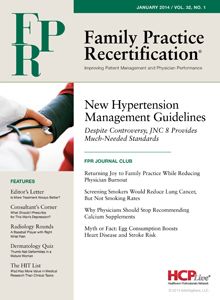Publication
Article
Why Physicians Should Stop Recommending Calcium Supplements
Author(s):
Calcium supplementation with or without a high-calcium diet increases the risk of heart disease, and thus should be discouraged.
Frank J. Domino, MD
Review
Michaëlsson K, Melhus H, Warensjö Lemming E, Wolk A, Byberg L. Long term calcium intake and rates of all cause and cardiovascular mortality: community based prospective longitudinal cohort study. BMJ. 2013 Feb 12; 346:f228. http://www.bmj.com/content/346/bmj.f228.
Study Methods
This prospective study examined a mammography cohort subset of 61,433 Swedish women born between 1914 and 1948 who completed a baseline questionnaire on their diet and lifestyle. In 1997, a second, expanded questionnaire was sent out to those who still resided in the study area.
Morbidity and mortality data obtained from a Swedish health registry were evaluated, and ICD-9 codes for cause of death were tracked. Additionally, calcium intake was evaluated with and without vitamin D supplementation. To determine the accuracy of the food-frequency questionnaires, a small study was conducted to compare the results with a 7-day food record. Consistency was very high with a slight tendency for a greater estimate of calcium intake in the food-frequency survey.
Information on the women’s use of hormone replacement therapy, menopausal status, parity, height and weight, tobacco use, educational level, vocational activity, and leisure time and exercise within the past year was gathered, and diagnostic codes were collected from the national registry to determine comorbidities that might influence the data.
Results and Outcomes
During a median of 19 years follow-up, 17% of the study cohort died — most commonly from cardiovascular disease (CVD), followed by ischemic heart disease (IHD) and then stroke.
The highest rates of mortality from all causes, CVD, and IHD — but not stroke — were observed among women with calcium intake >1,400 mg/day. The hazards ratios for high levels of calcium intake (>1,400 mg/day) compared to women who consumed <1,000 mg/day was 1.40 for all-cause mortality, 1.49 for CVD mortality, and 2.14 for IHD mortality — a finding that remained consistent after adjusting for multiple variables.
Those with calcium intake <600 mg/day also had a higher mortality rate, resulting in a U-shaped association between total calcium intake and death from all causes, CVD, and IHD, but not stroke.
Calcium supplementations were commonly used throughout the study. The largest source of supplemental calcium came from multivitamins with minerals, and most women who took calcium tablets also regularly consumed multivitamins.
Interestingly, women who had a dietary calcium intake >1,400 mg/day and consumed additional calcium supplements had a higher mortality rate than women who had a high dietary calcium intake but did not take supplements. Women who consumed 500 mg calcium tablets combined with a high dietary calcium intake >1,400 mg/day had a hazards ratio of 2.57 for all-cause mortality compared to those with a dietary calcium intake between 600-1,000 mg/day.
Use of vitamin D supplementation did not alter the associations between calcium intake and the rate of death from all causes, CVD, or IHD.
Conclusion
Among women, calcium intake >1,400 mg/day was associated with higher death rates from all causes, CVD, and IHD, but not stroke. The addition of a calcium supplement to a high-calcium diet increased the women's mortality risk even more.
Commentary
This study found women whose diets are high in calcium have a greater risk of death, especially from CVD; however, dietary calcium intake <600 mg/day also increased the women's mortality risk.
An earlier review of 15 trials found calcium supplementation without vitamin D increases the risk of myocardial infarction (MI) in both men and women,1 and some data from observational studies also implies women who take calcium supplementation for the prevention and treatment of osteoporosis have higher rates of CVD compared to those who do not take calcium supplements.
This new study suggests high calcium intake increases a woman’s mortality risk. While not a “cause and effect,” this observation provides a strong implication for how family physicians should counsel women on calcium supplementation, especially in their later years. Though it remains unclear whether vitamin D supplementation alone can lead to improved outcomes, calcium supplementation should not be recommended to female patients.
Dietary calcium also played a role in mortality, especially when its supplementation — either alone or as part of a multivitamin — was added to a diet already high in calcium, possibly from foods that include milk (300 mg/cup), yogurt (450 mg/cup), sardines (>350 mg in 2 ounces), and broccoli (300 mg/cup).
On the men’s side, a recent paper on dietary and supplemental calcium intake and CVD from the National Institutes of Health (NIH) and the American Association of Retired Persons (AARP) found diets supplemented with calcium resulted in a higher relative risk of CV death — and more specifically, heart disease death — but not stroke.2
There is no data to support recommending a high-calcium diet or calcium supplementation for men or women, especially when they are older adults. A 2013 systematic review and meta-analysis about the influence of calcium supplementation on all health outcomes found high calcium intake among children and postmenopausal women produced a slight improvement in bone mineral content and density, but not in fracture risk.3 The review also found no support for calcium supplementation for bone health in premenopausal women or men, and most importantly, it found no strong evidence that calcium supplementation reduces fracture risk.
After years of encouraging calcium supplementation, now is the time to stop. Those concerned with osteoporosis should instead consider weight-bearing exercise, less tobacco use, and possibly vitamin D supplementation. A high-calcium diet with or without calcium supplementation increases the risk of heart disease, and thus should be discouraged.
References
1. Bolland MJ, Avenell A, Baron JA, Grey A, MacLennan GS, Gamble GD, Reid IR. Effect of calcium supplements on risk of myocardial infarction and cardiovascular events: meta-analysis. BMJ. 2010 July 30; 341:c3691. http://www.bmj.com/content/341/bmj.c3691.
2. Xiao Q, Murphy RA, Houston DK, Harris TB, Chow WH, Park Y. JAMA Intern Med. 2013 Apr 22; 173(8):639-46. https://archinte.jamanetwork.com/article.aspx?articleid=1568523&resultClick=1.
3. Uusi-Rasi K, Kärkkäinen MU, Lamberg-Allardt CJ. Calcium intake in health maintenance - a systematic review. Food Nutr Res. 2013 May 16;57. http://www.ncbi.nlm.nih.gov/pmc/articles/PMC3657072/.
About the Author
Frank J. Domino, MD, is Professor and Pre-Doctoral Education Director for the Department of Family Medicine and Community Health at the University of Massachusetts Medical School in Worcester, MA. Domino is Editor-in-Chief of the 5-Minute Clinical Consult series (Lippincott Williams & Wilkins). Additionally, he is Co-Author and Editor of the Epocrates LAB database, and author and editor to the MedPearls smartphone app. He presents nationally for the American Academy of Family Medicine and serves as the Family Physician Representative to the Harvard Medical School’s Continuing Education Committee.






